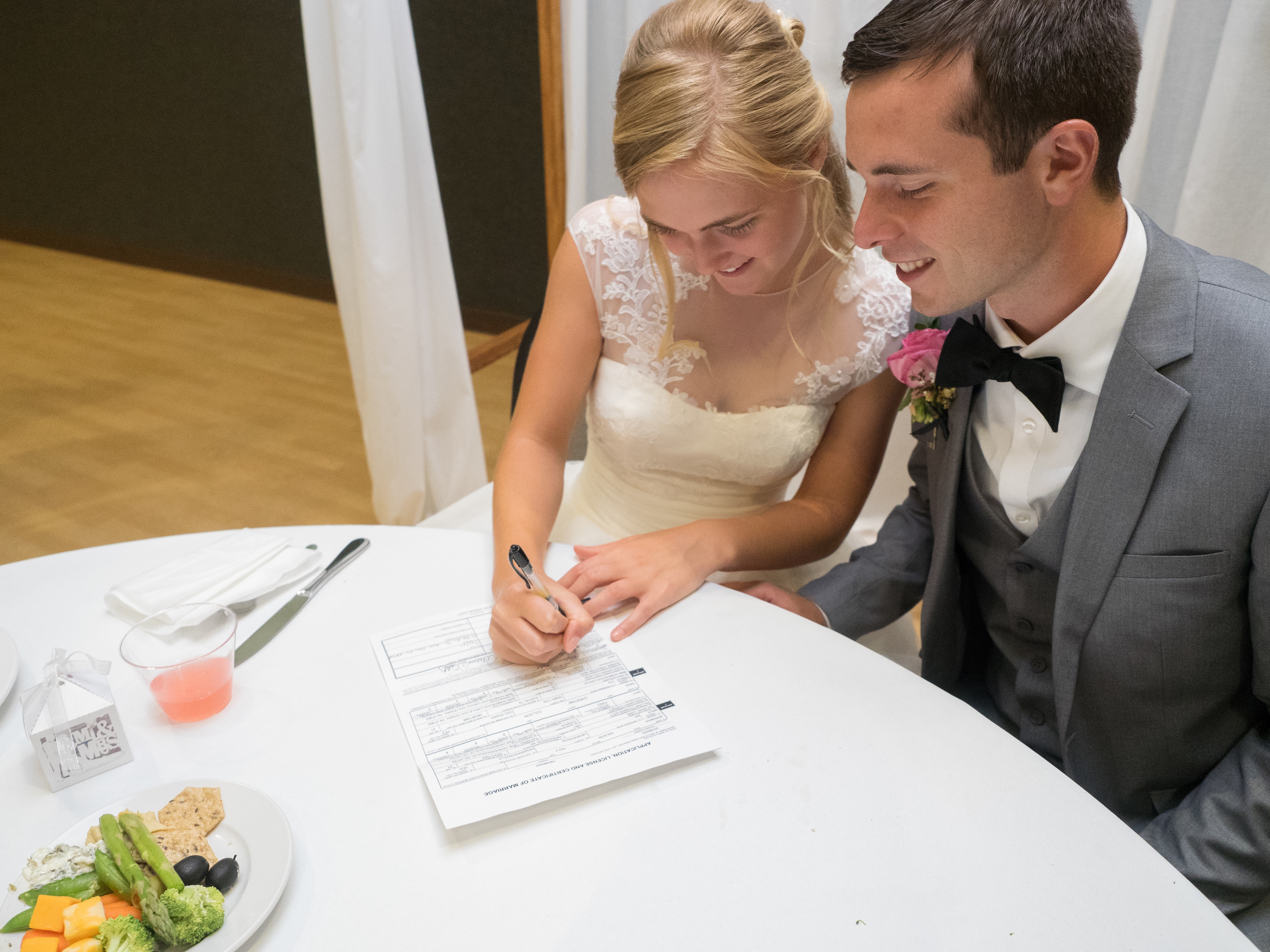If you’re getting married in Florida, you’ll want to at least consider getting a prenuptial agreement, also called a prenup. Florida is one of the 15 states with the highest divorce rates in the country. That means a depressingly large number of marriages end in divorce every year in the Sunshine State.
At first blush, the very mention of a prenuptial agreement might feel out of place amidst the romance of planning a Florida wedding. However, a Florida prenuptial agreement isn’t some harbinger of doom for your relationship. Instead, consider it a testament to the kind of love that is focused on the future.
When you strip away the misconceptions and fears, a premarital agreement in Florida is a commitment to mutual understanding between you and your partner. It’s not about “assuming the worst,” as some would believe. It’s planning for a potential future that can make everyone’s lives easier.
What is a Prenuptial Agreement?
Prenuptial agreements, at their core, are legal documents that both parties agree to before a marriage that, among other things, dictate how the couple’s assets will be divided in the event of a divorce.
These agreements are a contract entered into by two future spouses. This contract paints a clear picture of the financial landscape of the couple. It outlines, with precision, how assets (like property, savings accounts, and investments) and liabilities (like debts or loans) will be distributed if, for some reason, the marriage ends.
Of course, making plans for a marriage to end before the wedding has even happened doesn’t sit right with a lot of people. So even people who feel like prenups are important still end up getting married without one. It’s important to keep in mind that a prenuptial agreement doesn’t suggest a lack of faith in the relationship’s longevity. Instead, think of it as creating a roadmap, an exercise in foresight and planning, ensuring that should the unexpected happen, the couple is well-prepared.
Common Misconceptions about Prenuptial Agreements
Let’s clear the air. Prenups, despite their portrayal in glitzy celebrity magazines or dramatic movies, aren’t reserved for the Hollywood elite or business moguls alone. Here are some common myths:
- Reserved for the Wealthy: The prevailing thought is that prenups are the domain of high net worth individuals. But here’s the reality: they’re for anyone and everyone with assets, debts, or even particular wishes. You might not be a millionaire, but if you’ve started a small business, inherited a family heirloom, or even have student debt, a prenup can offer clarity during a time where everything else can seem uncertain.
- Harbingers of Divorce: Another widespread myth is that prenups are synonymous with expecting a divorce. It’s quite the contrary. Prenuptial agreements are a sign of open communication in your relationship. They encourage couples to discuss, sometimes for the first time, their financial situations, expectations, and potential future scenarios. Rather than forecasting a split, they fortify the foundation of a relationship by promoting honesty and understanding.
What Are the Benefits of a Prenuptial Agreement?
When discussing the benefits of prenuptial agreements in Florida, it’s important to understand that their value extends beyond mere legalities. One of the biggest benefits of a prenup is that it provides clarity. By laying out the financial realities and expectations of both individuals, a prenuptial agreement can significantly reduce potential confusion down the line.
For instance, Florida couples have the option to predetermine conditions around alimony or spousal support within their prenups. This can help avoid a prolonged and stressful battle in court and provides a clear picture of what both parties can expect in the unfortunate event of a split.
Prenuptial agreements in Florida can also address intricate details, such as life insurance payouts, retirement benefits, and how other financial instruments are managed. They can set clear guidelines about beneficiaries and distribution methods. Additionally, they provide a protective layer, ensuring that one partner isn’t burdened with the other’s significant debts during a divorce.
Legal Requirements for a Prenuptial Agreement in Florida
In Florida, the legal terrain surrounding prenuptial agreements is outlined by a set of distinct criteria to ensure both their legality and ability to be enforced. Foremost among these is the Uniform Premarital Agreement Act, under which the state operates. This act establishes the foundational requirements and provisions for prenuptial agreements, ensuring that both individuals involved receive equitable protection and have a comprehensive understanding of what the agreement entails.
Another major requirement is that all prenups must be written down to be legal. Simply put, oral prenuptial agreements are non-starters in Florida’s legal landscape; they won’t be recognized by the courts. Furthermore, a prenup won’t stand if one party was forced to sign the agreement. Even a hint of coercion or undue pressure applied to either party during its signing could be enough to bypass the prenup.
Being transparent during the process is also key. For the prenup to stand, both parties must be forthcoming about their financial situations, fully disclosing all assets and liabilities. An attempt to conceal assets, for example, can severely undermine the enforceability of the agreement.
While it’s not a strict legal requirement, it’s considered best practice for both parties to have the agreement reviewed by their respective attorneys. This is a measure that ensures both individuals comprehend the legal consequence of their pact and that the terms laid out are fair to both sides.
What Is Included in a Prenuptial Agreement
Navigating the legal and emotional landscape of prenuptial agreements requires a keen understanding of what these documents can cover and what they must legally avoid.
Can Be Included:
- Assets and Properties: Whether it’s real estate, personal items, or even family heirlooms, the ownership and future division of these can be detailed in a prenup.
- Debts: Debts, both prior to the marriage and those accrued during, can be addressed. This ensures that one party isn’t unjustly burdened with the other’s liabilities.
- Alimony or Spousal Support: The agreement can set parameters for, limit, or even waive alimony.
- Inheritance: A prenup can outline what happens to one’s estate upon death, especially in scenarios where one partner would like specific assets to go to children from a previous marriage or other family members.
Cannot Be Included:
- Child Custody and Child Support: The interests of children supersede any pre-established agreement. These matters are determined by courts based on the child’s best interests at the time of the parent’s separation or divorce.
- Personal Non-Financial Matters: Provisions that dictate personal choices, behaviors, or actions, such as where to spend holidays or penalties for weight gain, are not enforceable.
- Anything Illegal: It goes without saying that illegal provisions are void.
How Does a Prenuptial Agreement Impact a Divorce?
Divorces are stressful, even in the best of situations. A prenup is one tool that can help make the process easier for everybody, especially in Florida with its unique legal landscape.
In the realm of Florida divorce law, “equitable distribution” stands as the guiding principle when it comes to splitting marital assets and liabilities. This concept doesn’t necessarily dictate a strict 50/50 division. Instead, it seeks a distribution based on the fairness of each spouse’s individual circumstances.
One of the fundamental advantages of a prenup is its ability to clearly discern between what constitutes separate property (those assets owned prior to the marriage) and marital property (those acquired during the union). This distinction greatly reduces the potential for contentious debates over ownership.
Generally, a prenup can make a divorce happen quicker and be less expensive. By having many of the significant decisions previously established, couples can avoid prolonged legal battles, which not only alleviates emotional strain but can also lead to considerable savings in legal fees.
How to Discuss the Idea with Your Partner
Introducing the topic of prenuptial agreements requires sensitivity and care. Timing is of the essence; it’s vital to broach the subject when both individuals are calm and not under the strain of external stressors or during a disagreement.
Begin by laying out the reasons you believe a prenup is worth considering. Whether it’s the protection of business assets, ensuring the well-being of children from a past relationship, or simply seeking clarity on fiscal matters, clear and transparent communication about your motivations can greatly ease the process.
Make sure to frame the discussion around the collective benefits of such an agreement, emphasizing the sense of security and protection it provides for both partners. At the same time, it’s imperative to underline that considering a prenup doesn’t signify a waning commitment to the relationship. Instead, it’s a pragmatic approach to navigating the future, whatever it may bring.
If there are lingering doubts or reservations, jointly attending premarital counseling sessions can be a constructive step. Here, a neutral party can aid in guiding the conversation, addressing concerns, and quelling fears.
Lastly, while articulating your stance is essential, it’s also important to lend a keen ear to your partner’s views. Engage in active listening, address their queries, and validate their emotions. Tackling this conversation with empathy, patience, and collaboration can make all the difference.
Embracing Love’s Journey with Legal Clarity
Opting for a prenuptial agreement in Florida doesn’t detract from the romance or the commitment couples have for each other. Instead, it underscores a deeper understanding and mutual respect, recognizing the practicalities of life while cherishing the bond of love. It’s akin to buying insurance; we don’t expect mishaps, but it’s wise to be prepared.
Navigating the intricate landscapes of love and law can seem daunting, but with the guidance of experts in Florida family law, couples can pave the way for a journey that’s not just driven by emotions but also grounded in clarity and understanding. Remember, love is the foundation, and a well-structured prenuptial agreement is one of the bricks that can make that foundation even more robust and enduring.





